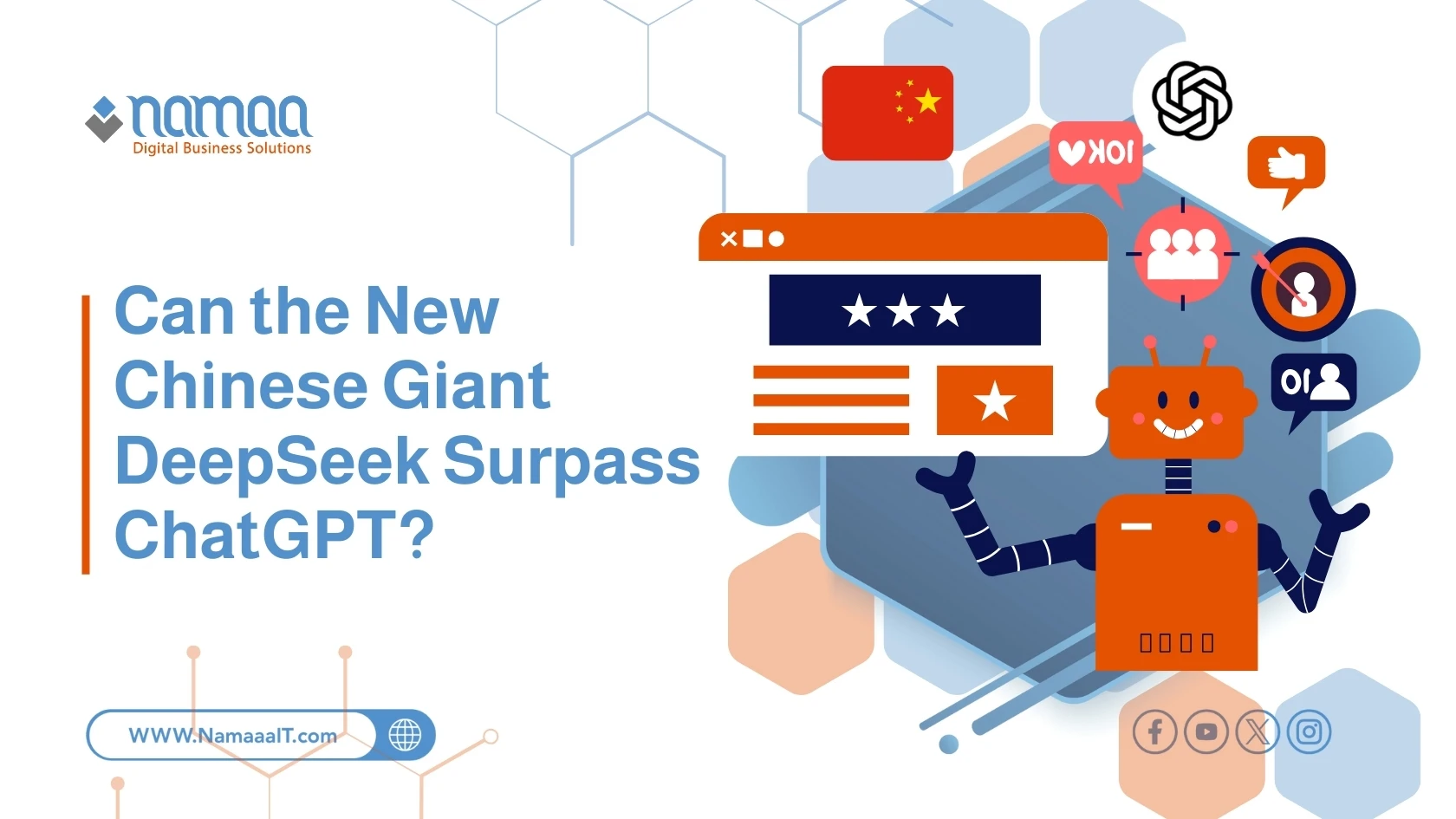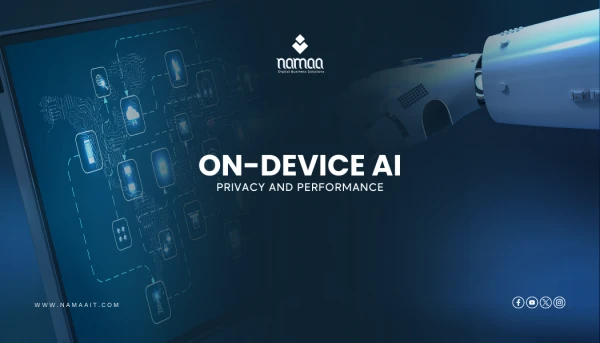Amid the rapid evolution of generative artificial intelligence, the Chinese company DeepSeek has emerged as one of the strongest competitors to OpenAI's ChatGPT model with the launch of its R1 model. DeepSeek has demonstrated outstanding performance in various areas such as programming, logic, and solving mathematical problems, positioning itself as a formidable competitor in the field. Furthermore, DeepSeek offers an open-source and free model, making it an attractive option for both developers and users. However, this competition raises questions about DeepSeek’s ability to surpass ChatGPT in other areas, such as natural language processing (NLP), image interaction, and speech generation. Additionally, critical issues like content censorship, data privacy, and cybersecurity remain central to evaluating the effectiveness of these models.
In this article, we will provide a comprehensive comparison between DeepSeek and ChatGPT, focusing on performance, cost, security, and censorship, to offer a clear picture of how DeepSeek might surpass ChatGPT.
What is DeepSeek?
DeepSeek is a Chinese AI startup founded in July 2023 by Liang Wenfeng, operating under the umbrella of the High-Flyer hedge fund. The company launched its large language model, DeepSeek-R1, in January 2025, which gained global attention due to its high performance and low cost.
DeepSeek-R1 is capable of delivering performance similar to advanced models like OpenAI’s GPT-4, but with a development cost not exceeding $6 million, compared to $100 million for similar models. The model uses a "Mixture-of-Experts" (MoE) architecture, enabling specific parts of the model to be activated as needed, thereby reducing resource consumption and enhancing efficiency.
The release of DeepSeek-R1 led to its app topping the download charts on the U.S. App Store, surpassing popular applications like ChatGPT. This rapid success has raised concerns among major U.S. companies, prompting them to reassess their AI strategies. However, DeepSeek faces challenges related to transparency, with questions raised about the use of data from other models to train its own, as well as concerns over content censorship and adherence to international standards.
In short, DeepSeek is an emerging and influential player in the AI field, balancing high performance with low cost, making it a focal point for tech enthusiasts worldwide.
Key Differences Between DeepSeek and ChatGPT
The most significant differences between DeepSeek and ChatGPT lie in their core architectures and training methods. ChatGPT relies on the GPT-4 model, supported by techniques like reinforcement learning from human feedback (RLHF), which enhances its ability to understand complex contexts and generate diverse text.
In contrast, DeepSeek uses an open-source model based on "Mixture-of-Experts" (MoE) technology, activating only specialized experts when necessary, thus helping reduce energy consumption and increase efficiency.
Furthermore, DeepSeek is considered more transparent in its development, as it provides developers access to its code and models, promoting customization and continuous improvement. On the other hand, ChatGPT is a closed-source model, which may limit users' ability to modify and customize it. These fundamental differences make the comparison between DeepSeek and ChatGPT an interesting one, highlighting the contrast between an open-source model and a closed-source model, with clear differences in structure, training, and transparency.
read more: Artificial Intelligence in Digital Marketing
How DeepSeek Outperforms ChatGPT in Natural Language Processing?
In natural language processing (NLP), DeepSeek appears as a strong alternative to ChatGPT, thanks to its advanced techniques. DeepSeek excels at understanding complex contexts and generating text with high accuracy, making it suitable for applications such as machine translation, content generation, and text analysis.
Moreover, DeepSeek outperforms in dealing with non-English languages, as it is trained on multilingual datasets, improving its accuracy and efficiency in these languages. ChatGPT, however, primarily focuses on English, which may impact its performance in other languages.
Additionally, DeepSeek demonstrates a more natural interaction with users, enhancing the overall user experience. These advantages make DeepSeek a noteworthy contender in the NLP space, outperforming ChatGPT in some aspects due to its advanced techniques and diverse training.
Comparison Between DeepSeek and ChatGPT in Solving Mathematical Problems
When comparing DeepSeek and ChatGPT in solving mathematical problems, DeepSeek shows superior performance thanks to its focus on logical reasoning techniques. DeepSeek excels at analyzing complex mathematical problems and providing accurate, systematic solutions, making it ideal for educational and research applications.
Conversely, ChatGPT performs well with basic mathematical problems but may face challenges with more complex ones. Additionally, DeepSeek is more efficient in terms of energy and resource consumption, making it a preferred option for applications requiring fast and effective processing. In comparison, ChatGPT might require more resources to achieve similar performance. This comparison highlights DeepSeek's advantage in some aspects of mathematical problem-solving due to its advanced techniques and high efficiency.
DeepSeek's Performance in Programming vs. ChatGPT
In the field of programming, a comparative study between DeepSeek-R1 and ChatGPT-03-mini showed DeepSeek’s superiority in solution accuracy, especially in mathematical tasks and complex algorithms. For instance, in challenges on the Codeforces platform, DeepSeek achieved a success rate of 18.1% in medium-difficulty tasks, while ChatGPT recorded a rate of 54.5%, indicating ChatGPT’s strength in this area.
Nevertheless, DeepSeek showed superior performance in mathematical tasks, with more accurate solutions and fewer errors. On the other hand, ChatGPT is more efficient in memory and time usage, requiring fewer lines of code, which makes it suitable for tasks that demand speed and efficiency. Therefore, the comparison reveals differences between the two models in programming, with each excelling in certain areas depending on the nature of the tasks.
DeepSeek Development Cost vs. ChatGPT
Comparisons between DeepSeek and ChatGPT reveal a significant difference in development costs, with the cost of developing DeepSeek-R1 being approximately $5.6 million, while the development cost for ChatGPT-4 exceeded $78 million. This disparity is attributed to DeepSeek's use of the "Mixture-of-Experts" (MoE) architecture, which activates only specialized experts as needed, reducing energy consumption and increasing efficiency. In contrast, ChatGPT uses a dense architecture requiring more resources.
Additionally, DeepSeek demonstrated resource efficiency, training its model using around 2,000 H800 GPU units, compared to 16,000 units for ChatGPT. This demonstrates DeepSeek’s ability to achieve high performance with fewer resources and at a lower cost, making it an attractive option in terms of cost-effectiveness compared to ChatGPT.
Global Adoption and Usage
Although ChatGPT has been the dominant tool in office environments, with a study showing that 76% of global offices used it by the end of 2024, DeepSeek has seen rapid growth in popularity. By January 2025, DeepSeek's apps had surpassed ChatGPT in downloads on the U.S. Apple App Store, becoming the most downloaded free app. This success is attributed to DeepSeek offering an open-source and free model, attracting developers and users seeking low-cost alternatives.
On the other hand, ChatGPT offers paid subscriptions for access to advanced features, which could be a barrier for some users. Therefore, the comparison between DeepSeek and ChatGPT reflects differences in global adoption and usage, with DeepSeek growing rapidly thanks to its open and free strategy, while ChatGPT maintains a wide user base due to its advanced features and institutional support.
Challenges Facing DeepSeek in Global Expansion
Despite the local success DeepSeek has achieved in China, its global expansion faces multiple obstacles. One of the main challenges is the restrictions imposed by the United States on exporting advanced technologies. The U.S. government is considering sanctions to prevent DeepSeek from acquiring American technologies, such as advanced Nvidia chips, due to national security concerns.
There have also been accusations that DeepSeek obtained around 60,000 advanced Nvidia chips despite the restrictions, raising concerns among U.S. lawmakers. Additionally, DeepSeek faces challenges in building global trust and recognition, especially in Western markets dominated by companies like OpenAI and Google. DeepSeek is viewed as a Chinese startup, raising questions about transparency and compliance with international standards.
Transparency and Open Source
DeepSeek promotes itself as an open-source model, announcing its intention to release five code repositories to enhance transparency. However, some experts argue that DeepSeek does not fully meet open-source standards, as it has not shared training data or performance evaluations completely, raising questions about its commitment to transparency.
In contrast, ChatGPT is a closed-source model, limiting users' ability to verify or modify its workings. This contrast between DeepSeek and ChatGPT highlights the transparency challenges in AI models, where users and developers seek a better understanding of how these models function and their impact on privacy and security.
Content Moderation in DeepSeek and ChatGPT
The comparison between DeepSeek and ChatGPT reveals differences in content moderation policies. DeepSeek imposes strict restrictions aligned with Chinese government policies, preventing the model from discussing sensitive topics such as the Tiananmen Square protests or Taiwan’s status, and it shows clear bias in some responses.
In contrast, ChatGPT has faced criticism for excessive content moderation, prompting OpenAI to remove some warnings about policy violations in an attempt to strike a balance between freedom of expression and safety. This comparison highlights the challenges faced by AI models in handling sensitive content, where a balance must be struck between complying with local policies and ensuring freedom of expression for users.
Security and Data Protection in DeepSeek vs. ChatGPT
The issue of security and data protection in DeepSeek and ChatGPT has sparked widespread debate, particularly with the increasing reliance on AI models in daily life. DeepSeek has faced sharp criticism for storing user data on servers within China, raising concerns about the potential for Chinese government access to this data, according to China’s National Intelligence Law.
Reports have also revealed security vulnerabilities in DeepSeek, such as the leakage of databases containing user conversations and secret keys, putting privacy at risk. In contrast, ChatGPT relies on American infrastructure and adheres to Western security standards, offering a higher level of transparency and trust for users, despite some criticisms related to data collection. This disparity in security policies creates a contrast between DeepSeek and ChatGPT, with DeepSeek raising concerns over data protection while ChatGPT adheres to more transparent and recognized standards.
Summary
✅ DeepSeek outperformed in some programming tests, achieving an 18.1% success rate in medium-level programming challenges on the Codeforces platform, compared to ChatGPT, which recorded 54.5%.
✅ The development cost of DeepSeek is much lower than ChatGPT, with only $5.6 million compared to nearly $78 million for the development of ChatGPT-4.
✅ DeepSeek uses fewer resources, with the model being trained on approximately 2,000 H800 GPU units, while ChatGPT used more than 16,000 GPU units.
✅ DeepSeek has seen massive growth in global usage, with its free apps topping the App Store in the United States in January 2025, surpassing ChatGPT.
✅ DeepSeek’s language processing is advanced and multilingual, showing excellent performance in non-English languages, whereas ChatGPT primarily focuses on English.
✅ DeepSeek is partially open-source, with an announcement to release 5 code repositories, while ChatGPT remains a closed-source model.
✅ Security concerns surround DeepSeek, with leaks of user data and accusations of illegally acquiring more than 60,000 Nvidia chips.
✅ Content moderation in DeepSeek is strict, with restrictions on discussing topics like the Tiananmen Square protests or Taiwan’s status, while OpenAI has partially relaxed content moderation in ChatGPT.
✅ DeepSeek achieves higher accuracy in machine translation in some languages and cultural contexts, while ChatGPT excels in popular languages and quick processing.
✅ Despite its capabilities, DeepSeek faces difficulties in global expansion due to U.S. technological bans and lack of Western trust, hindering its ability to surpass ChatGPT at the moment.








.webp)
